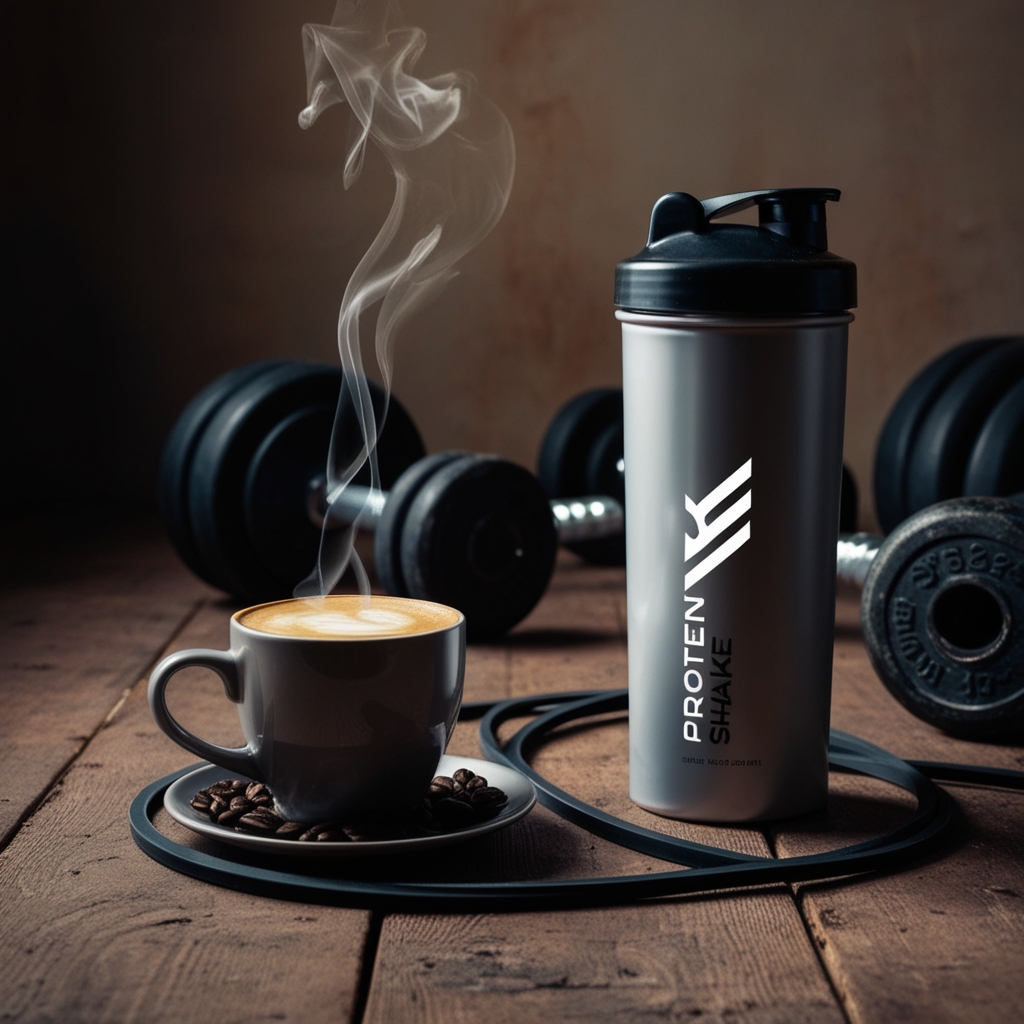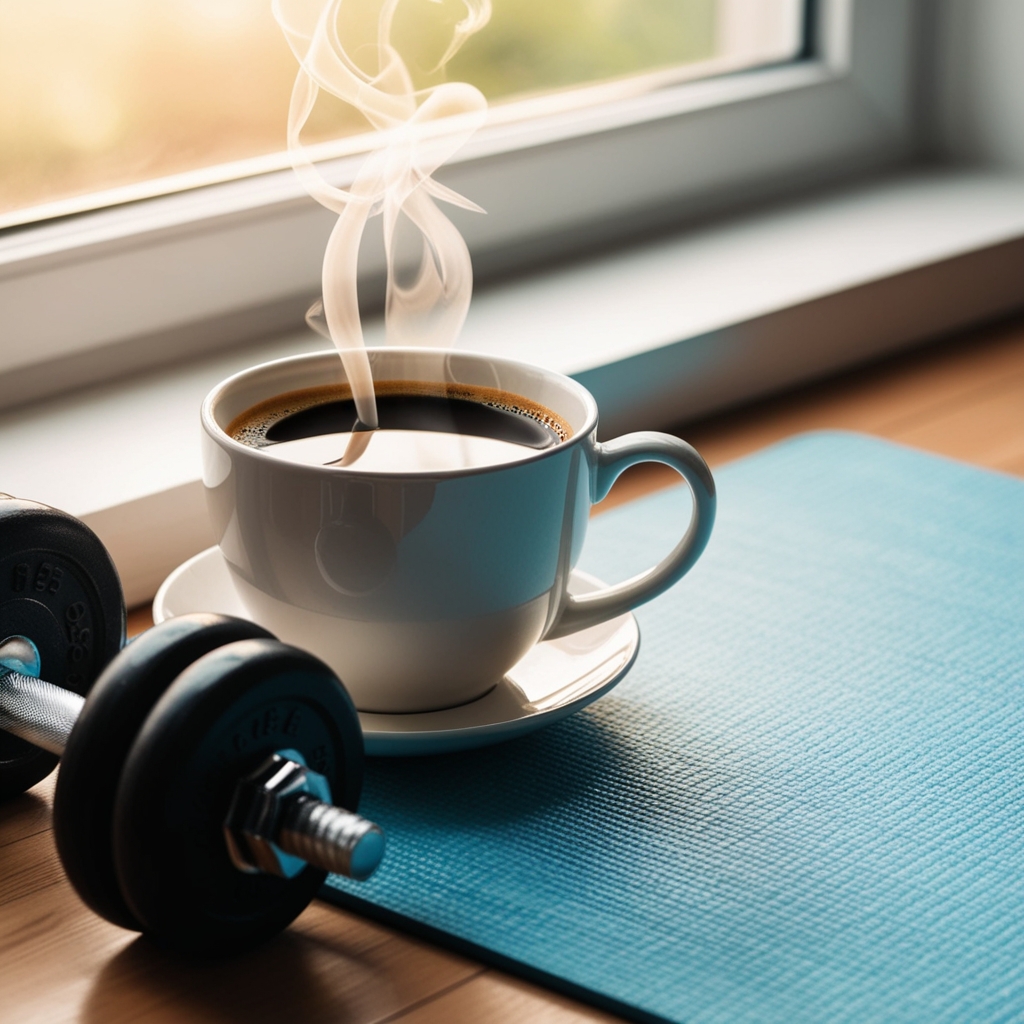Did you know that nearly 64% of Americans drink coffee every day? A growing number of fitness enthusiasts also add it to their post-workout routine. The rise in post-workout caffeine use has sparked debates. Many wonder if it’s good or bad for our health. I’ve always been curious about coffee after exercise: good or bad?
So, I looked into the coffee health benefits and its effects on muscle recovery.

I have been exploring my relationship with coffee post-exercise thus far. See how that morning cup impacts muscle recovery, energy, and well-being.
Why I Started Drinking Coffee After Workouts
I was curious how coffee might help me workout or recover. It took me a long time to try because I was skeptical.
My Initial Hesitations
Like many, I had doubts. Will coffee make me jittery after a workout? Can this wreck my recovery? I wanted to know more before I tried it.
The First Experience
I tried it one day. After my workout, I made a cup of coffee. It was exciting, and I was not sure how it would affect me. The first time I sipped, I was suddenly more energetic and alert.
Immediate Benefits Noticed
Benefits were apparent right away. My energy went up, and I felt more alive. That added energy helped me stay with my workout. I also recovered faster so I could work out harder next time around.
The Science Behind Coffee and Exercise
After exercise, many drink coffee—what happens to us inside? Learn how caffeine affects our metabolism, enhances exercise performance, and speeds recovery.
How Caffeine Affects the Body
Coffee swiftly enters the bloodstream and supports the nervous system. We are more alert and focused. It also speeds up how we make energy, which helps us do better in exercises. Do you know how much caffeine is in a cup of coffee? Click here.
Endorphins from caffeine also lower pain. This means muscle cramps after working out are less painful. If you want to understand the science behind coffee and heart health, here you go.
Scientific Studies on Coffee Post-Workout
Studies show caffeine helps with recovery after exercise. A study by the American Physiological Society found it reduces muscle pain. The Journal of Applied Physiology published another study concluding that the combination of caffeine and carbs aids athletes in recovering faster.
A study in the International Journal of Sports Nutrition reported caffeine also helps with recovery. This is particularly beneficial for athletes and individuals who engage in frequent physical activity.
| Benefits | Explanation |
|---|---|
| Improved Focus | Caffeine stimulates the central nervous system, aiding concentration. |
| Energy Production | Speeds up the metabolic processes involved in creating energy. |
| Pain Relief | Increases endorphin production, helping to alleviate muscle pain. |
| Enhanced Glycogen Resynthesis | Combining caffeine and carbs can expedite muscle glycogen recovery. |
Coffee After Exercise: Good or Bad?
Ever wonder if coffee is beneficial after a workout? People ask this. Look at the good and the negative sides.
Advantages of Drinking Coffee Post-Workout
Drinking coffee can lessen muscle soreness after exercise. This reduces the pain. This allows faster recovery.
Coffee also makes you alert and focused. This is useful for keeping sharp after a workout.
You may perform better during future workouts if you take caffeine. Many athletes do better with caffeine in endurance tasks.
Potential Downsides to Consider
But drinking coffee after exercise has its downsides, too. Coffee acts as a diuretic, which could lead to water loss. Especially if you sweat a lot.
You might also feel jittery or have an increased heart rate with caffeine. Caffeine isn’t ideal after a workout.
Evening coffee can ruin your sleep, too. Insufficient rest may harm your recovery and health. This could erase the beneficial things about caffeine.

What Experts Say
Prof. Dr. Louise Burke speaks in moderation. The caffeine may help, but do not drink too much, she says.
And Dr. Michael F. Bergeron agrees. He says that how much caffeine works for one person may not work for another. Choosing the right amount can give you the benefits without the adverse effects.
In conclusion, there are differing views on the use of coffee after exercise. So listen to experts and think about your own body.
Personal Pros of Having Coffee After a Workout
I like drinking coffee after exercise. And the added post-workout alertness is a plus. My coffee wakes me up fast after a tough gym session. I feel alert and ready for the day.
Great for concentration! When I work out with coffee, I can focus better on tasks. This helps me stay on task and productive. It helps me out.
It may also ease muscle aches. Its anti-inflammatory properties lessen the soreness I feel after hard workouts. That cuts down my recovery time. I can do my exercise without getting tired.
These benefits are key to my post-workout routine. They help with my physical health and mood. Exercise + coffee = beneficial stuff. Try one after your next workout and see the benefits for yourself!
Potential Cons to Keep in Mind
Having coffee after a workout has benefits and downsides. Caffeine can impact your sleep and digestion.
Impact on Sleep Patterns
It affects people differently, but it can interfere with sleep. If you drink coffee too close to bedtime, you may have trouble falling or staying asleep. I love fitness and found that drinking coffee after evening workouts made me sleepy at night.
Digestive Concerns
Post-workout digestion is another thing to consider. The caffeine speeds digestion but may make some uncomfortable. I found that having a big coffee after a tough workout made me feel bloated or uneasy. This got worse if I had an empty stomach or was sensitive to caffeine.
Knowing those things might help you modify your post-workout regimen. Understand how coffee effects your sleep and digestion. This information enables better decisions.
Alternatives to Coffee After Exercise
Looking for post-workout drinks is enjoyable and useful. Don’t you drink coffee? Here are some alternatives. These are recovery drinks that are widely available.
Green Tea as an Option
Green tea is my first choice after working out. It contains antioxidants that ease muscle soreness. It also provides a milder dose of caffeine than coffee without the jitters.
Green tea also boosts your metabolism. You might find this helps you recover faster after a tough workout. You can grab this one if you want a healthy coffee alternative.
Protein Shakes
Protein shakes help muscles recover. They repair and rebuild muscle that sustains damage during exercise. After my workouts, I mix a protein shake.
You can get whey or plant protein shakes. Adding fruit or veggies can make a shake taste better and healthier.
Hydration with Herbal Teas
After exercise, drink herbal teas. They come in chamomile, mint, and ginger flavors. These are excellent after-workout teas.
Herbal teas can relax and speed up recovery. They also reduce inflammation following exercise. They have no caffeine, so you stay hydrated and fresh.
Having different drinks after a workout has many benefits. From green tea to protein shakes and herbal teas, each has its benefits. Choosing one of these may meet your recovery needs.
Is It Beneficial to Drink Coffee with Brown Sugar After Exercise?
Drinking coffee with brown sugar after exercise can be advantageous. It not only replenishes energy but also provides antioxidants from coffee. The benefits of brown sugar in coffee include added minerals and a subtle sweetness that enhances flavor, making your post-workout drink both enjoyable and beneficial for recovery.
Conclusion
How caffeine and exercise work together—I learnt a lot. A cup of coffee after a workout gives me energy. But everybody responds to caffeine differently.
Research and my experience show the benefits and drawbacks of having coffee after exercise. Good stuff: better focus and performance! Downsides include insomnia and stomach problems. A balance is important for health.
Watch how your body reacts to what you do. Try something like coffee, green tea, or protein shakes. Unsure? Ask health pros what your best post-workout routine is. What really matters are choices that keep you active and healthy.
FAQ
Is drinking coffee after exercise good or bad?
Drinking coffee after exercise has both good and bad sides. It can make you more alert and might help with muscle recovery because of caffeine. But it can also mess with your sleep and digestion. It’s key to think about these things and see what’s best for you.
What are the benefits of post-workout caffeine intake?
After a workout, caffeine can give you more energy, help you focus, and might help with muscle recovery. Many people say a cup of coffee after a workout keeps their morning energy up and helps with muscle soreness.
How does caffeine affect muscle recovery?
Caffeine might help with muscle recovery by making muscle soreness and fatigue feel less. It can also help with glycogen resynthesis, which is important for fixing muscles after exercise.
Can drinking coffee after exercise improve my concentration?
Yes, caffeine can make you more alert and focused. Drinking coffee after a workout can help you stay sharp and focused for the rest of your day.
Are there scientific studies supporting coffee consumption post-workout?
Many studies have looked into how caffeine affects exercise and recovery. Most studies say caffeine can improve endurance and lessen muscle soreness. But, how it affects people can vary.
What are some potential downsides of drinking coffee after a workout?
Downsides include bad sleep patterns, especially if you drink it too late, and some people might get upset stomachs. It’s important to see how your body reacts to caffeine after working out.
What do experts say about caffeine’s impact on exercise recovery?
Experts have different views but mostly agree that a little caffeine can be good for some people. They suggest balancing caffeine with water and not just relying on coffee for recovery.
How might coffee after exercise affect my sleep?
Caffeine can mess with your sleep if you drink it too close to bedtime. It’s best to skip coffee in the late afternoon and evening to keep your sleep cycle on track.
What are alternative post-workout beverages to coffee?
You can try green tea, protein shakes, or herbal teas instead of coffee. Green tea gives a smaller caffeine boost and antioxidants for recovery. Protein shakes help with muscle repair, and herbal teas can help with staying hydrated and relaxed.
How can green tea serve as an alternative to coffee after workouts?
Green tea has less caffeine and lots of antioxidants, which can help with recovery and reduce muscle inflammation. It gives a gentler energy boost than coffee.
Are protein shakes effective post-workout options?
Yes, protein shakes are great for muscle recovery. They give you the amino acids your muscles need to repair and grow. They’re a key part of your post-workout nutrition.
Can herbal teas aid in post-exercise hydration?
Yes, herbal teas are a caffeine-free choice that can help you rehydrate after a workout. They also offer extra benefits like lowering inflammation and helping with digestion.




